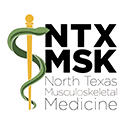Balance
 Our bodies continually strive to obtain homeostasis, a term coming from a Greek word meaning “same” or “steady.” We try to eat well, do yoga, get plenty of rest, all for the purpose of balance and optimal health. In homeostasis, all parts of the body work together in harmony. Just one thing being off balance, however, can affect the entire body negatively. The body’s endocannabinoid system (ECS) is key in maintaining homeostasis. Although one of the body’s largest neurotransmitter networks, this crucial physiological system was not discovered until the 1980’s while researching the effects of the cannabis plant.
Our bodies continually strive to obtain homeostasis, a term coming from a Greek word meaning “same” or “steady.” We try to eat well, do yoga, get plenty of rest, all for the purpose of balance and optimal health. In homeostasis, all parts of the body work together in harmony. Just one thing being off balance, however, can affect the entire body negatively. The body’s endocannabinoid system (ECS) is key in maintaining homeostasis. Although one of the body’s largest neurotransmitter networks, this crucial physiological system was not discovered until the 1980’s while researching the effects of the cannabis plant.
To provide optimal function, the human body creates its own endocannabinoids by getting enough sleep, combating illness and disease, and regulating pain. When the system becomes unbalanced or deficient, there can be a major impact on how we feel. Although the ECS fuels production of cannabinoids from within the body, production is often impaired or slowed due to age, stress, toxins, and lifestyle. When endocannabinoid production slows, we do not sleep well, we feel pain, or we fall ill.
 The ECS system of neuromodulatory lipids and their receptors are involved in physiological processes, including appetite, sleep, pain-sensation, mood, and memory. Dysregulation or deficiency is linked to a number of illnesses.
The ECS system of neuromodulatory lipids and their receptors are involved in physiological processes, including appetite, sleep, pain-sensation, mood, and memory. Dysregulation or deficiency is linked to a number of illnesses.
CBD interacts with and helps regulate the human body’s endocannabinoid system’s cannabinoid receptors. Source?
The endocannabinoid system is composed of three parts:
- Cannabinoids and Endocannabinoids, a form of lipid
- Cannabinoid receptors that the Cannabinoids and Endocannabinoids bond with
- Enzymes that synthesize the Endocannabinoids.
Almost all of our body’s functions are determined by communication between the central nervous system, CB1 receptors, and the peripheral nervous system, CB2 receptors. These receptors are activated by cannabinoids. The cannabinoid receptors are able to identify the source of problems in the body and release enzymes that can help restore balance to these areas. By ingesting cannabinoids in CBD, we activate the ECS system and enhance the body’s ability to establish homeostasis.
Endocannabinoid receptors are smart: they are able to act only on the bodily functions that are “off” or out of balance in order to achieve a precision level of homeostasis. The receptors cannot over function to negatively affect one system while attempting to bring balance to another. They work where and when they need to without going “overboard.” (2)
Endocannabinoid System
 Our body’s endocannabinoid system (ECS) is a complex network of receptors found mostly in the brain, immune system and throughout the central and peripheral nervous systems. It serves as a biochemical communication system within the body, a bridge between the mind and body connecting them to various organ systems. When the bridge breaks down, so do we.
Our body’s endocannabinoid system (ECS) is a complex network of receptors found mostly in the brain, immune system and throughout the central and peripheral nervous systems. It serves as a biochemical communication system within the body, a bridge between the mind and body connecting them to various organ systems. When the bridge breaks down, so do we.
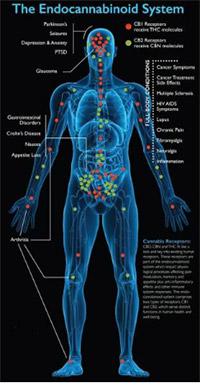 This system regulates balance in the body, which means it affects a variety of functions like blood pressure, sleep, immune responses, mood, and more. When the endocannabinoid system is in balance, you’re likely to function – and feel – your best!(1)
This system regulates balance in the body, which means it affects a variety of functions like blood pressure, sleep, immune responses, mood, and more. When the endocannabinoid system is in balance, you’re likely to function – and feel – your best!(1)
The endocannabinoid system is composed of three parts:
- Cannabinoids and Endocannabinoids, a form of lipid
- Cannabinoid receptors that the Cannabinoids and Endocannabinoids bond with
- Enzymes that synthesize the Endocannabinoids.
Almost all of our body’s functions are determined by communication between the central nervous system, CB1 receptors, and the peripheral nervous system, CB2 receptors. These receptors are activated by cannabinoids. The cannabinoid receptors are able to identify the source of problems in the body and release enzymes that can help restore balance to these areas. By ingesting cannabinoids in CBD, we activate the ECS system and enhance the body’s ability to establish homeostasis.
Endocannabinoid receptors are smart: they are able to act only on the bodily functions that are “off” or out of balance in order to achieve a precision level of homeostasis. The receptors cannot over function to negatively affect one system while attempting to bring balance to another. They work where and when they need to without going “overboard.” (2)
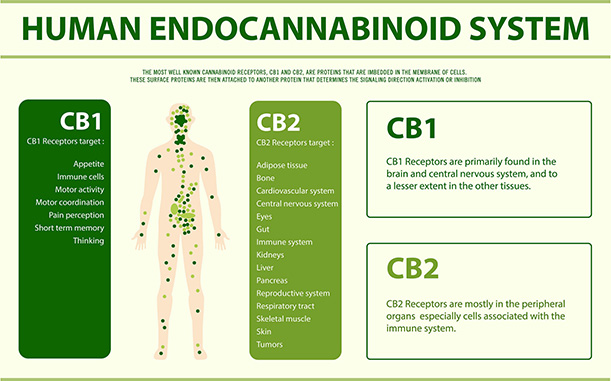
Benefits of CBD oil
- Pain relief. 11.2% of Americans suffer from chronic pain. Of those, 17% suffer from severe pain levels on a daily basis. Because pain can often be traced back to inflammation, CBD’s anti-inflammatory effects may be a natural treatment option, free from the side effects of over-the-counter painkillers.
- Anxiety relief. CBD can interact with the endocannabinoid system to reduce anxiety, even for long-time suffers. CBD for anxiety can lead to a better overall quality of life and improve daily functions.
- Counter drug and smoking withdrawal effects. Smoking cessation and opioid withdrawal symptoms are serious hindrances to moving forward. Recent studies have suggested CBD oil may help relieve withdrawal symptoms, leading to more successful treatment cessation (3) (4)
Studies have shown other positive responses for issues such as:
- Pain relief
- Anxiety relief
- Deep sleep
- Focus and memory
- Cognitive abilities
- Energy levels
- Mood stability
- Blood pressure
- Cortisol levels
- Hormone balance
- Movement issues
- Healthy weight maintenance (5) (6)
All CBD oil is not alike
Simply put… it’s not how much you take, but how much you absorb!
Absorption and bioavailability: how fast does it work and what percentage is absorbed?

Chemistry 101 tells us the water and oil do not mix. The oil simply floats to the top. The molecules of oil are too big, making them unable to mix in a solution.
In order to benefit from our nutrition, food must be readily absorbed by our intestines, which are lined in a fine layer of water. Liquids and solids that are oil-based pass through our digestive system, unable to pass through the water barrier. When you take oil-based supplements, the majority of their benefits are not absorbed by your body, leading to bioavailability rate of less than 10%.
Industry standard for CBD oil absorption is 3-6% with a 2-4 hour onset of action. This standard requires extremely large amounts of oil to get even a small result. Mayo Clinic found that Zilis water-soluble UltraCell absorbs within a 5-15 minute period and stays in the system for over 12 hours. Absorption rate was up to 95%. These standard far outpace other, less expensive brands that require more CBD oil to receive lesser results,making them, In the end, far more costly.
In an Independent Clinical Study twenty subjects were each given 4.12cc amounting to 10.9 mg of Zilis UltraCell CBD. Blood tests were drawn every hour for a total of 12 hours. Results showed that at 45 minutes 6.4 mg had been absorbed into the blood. At 1 hour 45 minutes, 9.0 had been absorbed with this range remaining for 12 hours.
UltraCell absorption enhancer adds significantly more bioavailability to CBD. In the study, “average absorption after one hour was 83%, with a maximum absorption of up to 94%.”
Zilis UltraCell… THE GOLD STANDARD
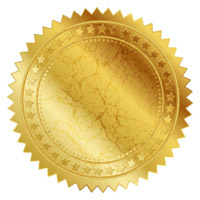
- USDA Certified Organic
- NO nanotechnology
- NO synthetics, chemicals, colorings, artificial flavorings, heavy metals, or emulsifiers
- Full Spectrum Hemp with over 120 phyto-cannabinoids (NO isolates)
- CO2 Extraction (NO chemicals used to process plant into oil)
- Water-soluble proprietary delivery system (patent pending)
- 5-15 minute onset (tested)
- 12 hour bioavailability
- Independent studies at Mayo Clinic
- #1 CBD US market (because it works!)
- Guaranteed 0.0% THC
- NO xylitol (safe for pets)
- Sublingual & topical options
- Up to 95% absorption (tested)
- Mimetix Line
(hemp-free alternatives and boosters) - Nothing harmful is ever added to Zilis products
CBD oil vs THC
Cannabinoid, or CBD, is a chemical naturally found in plants that produce over 400 different compounds. Most are found in other plants. Sixty of them are unique to cannabis plants and are classified as cannabinoids. These can be isolated for medical use. Cannabinoid (CBD) is one of these compounds and is completely separate from THC with psychoactive affects associated with recreational marijuana use. There are 2 forms of Cannabis. Hemp is not the form of cannabis that produces a "high," and is not psychoactive because hemp has a very low trace amounts of THC. Understanding the difference between the two is critical. (6)
CBD, opposed to THC, lacks psychoactive qualities. It cannot get you high.
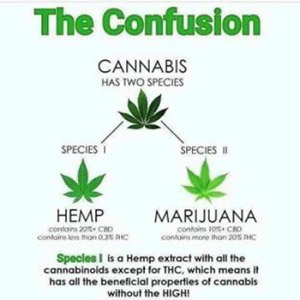
Understanding the terms
CANNABIS
Cannabis is a type of plant with different varieties, including marijuana plants and hemp plants. These plants produce over 400 compounds, over sixty of which are unique to the plant and can be isolated for medicinal purposes.
CANNABINOIDS
Cannabinoids are the active chemical compounds unique to cannabis plants.
CANNABIDIOL
Cannabidiol – or CBD – is a cannabinoid found in the seeds, stalks, and flowers of the cannabis plant. It occurs naturally and can be extracted, independent of other cannabinoids, in oil form.
THC
Tetrahydrocannabinol – or THC – is known for its psychoactive effects and is the compound responsible for the “high” produced by recreational and medical cannabis or marijuana.(7)
Legal history
USDA General Counsel Memorandum reports that on December 20, 2018, the Agriculture Improvement Act of 2018 legalized hemp production for all purposes within the statute. Hemp has been removed from Schedule I of the Controlled Substances Act and is no longer a controlled substance.
Sale of CBD oil and other hemp products remained in a legal gray area. 2018 US Farm Bill decriminalized the use of hemp. Sales, however, remained in conflict with many state laws and enforcement was sporadic. Many states have passed legislation to remove this conflict with federal and state laws., including Texas.
“The sale of certain consumable hemp products, such as CBD oil, is officially legal in Texas.” (8) June 10 Texas passed House Bill 1325 allowing the sale of hemp products with a threshold of 0.3%. Prior to this, physicians licensed to prescribe medical CBD with slightly higher THC content under the 2015 Compassionate Use Act had been using cannabis for treatment of epilepsy and other conditions with few solutions.
Because CBD is now legal, the industry will be regulated, ensuring that products are derived from properly sourced hemp. Manufacturers will include a QR code linking consumers to information on this source.
Further reading: Case study: The Journal of the American Osteopathic Association
Many scientists view CBD oil as a New Frontier in Medicine. As research learns more and more about how our bodies work, physicians are able to offer patients more and better options to help them function better naturally. Medicine is changing. The wonders of the human body and its ability to balance and heal itself are at the center of this medical renaissance.
This content is presented for informational purposes only. It is not for diagnostic or treatment purposes.
